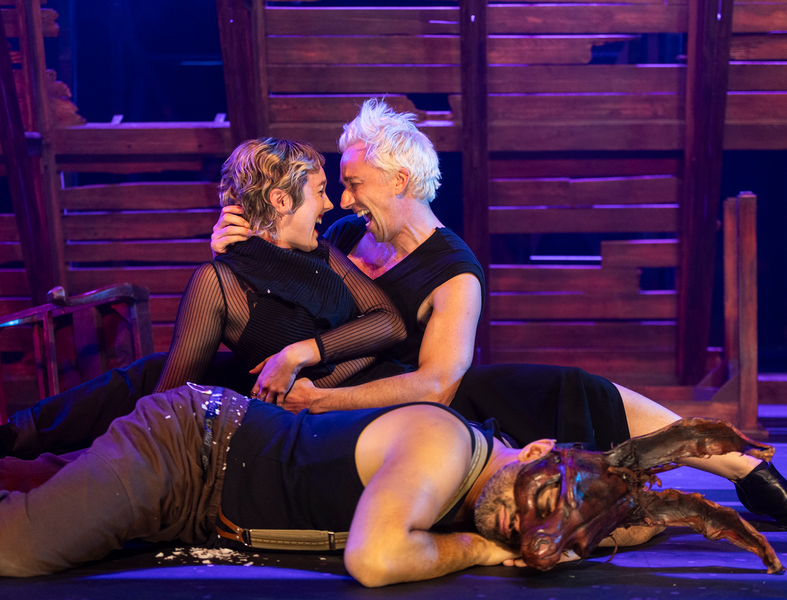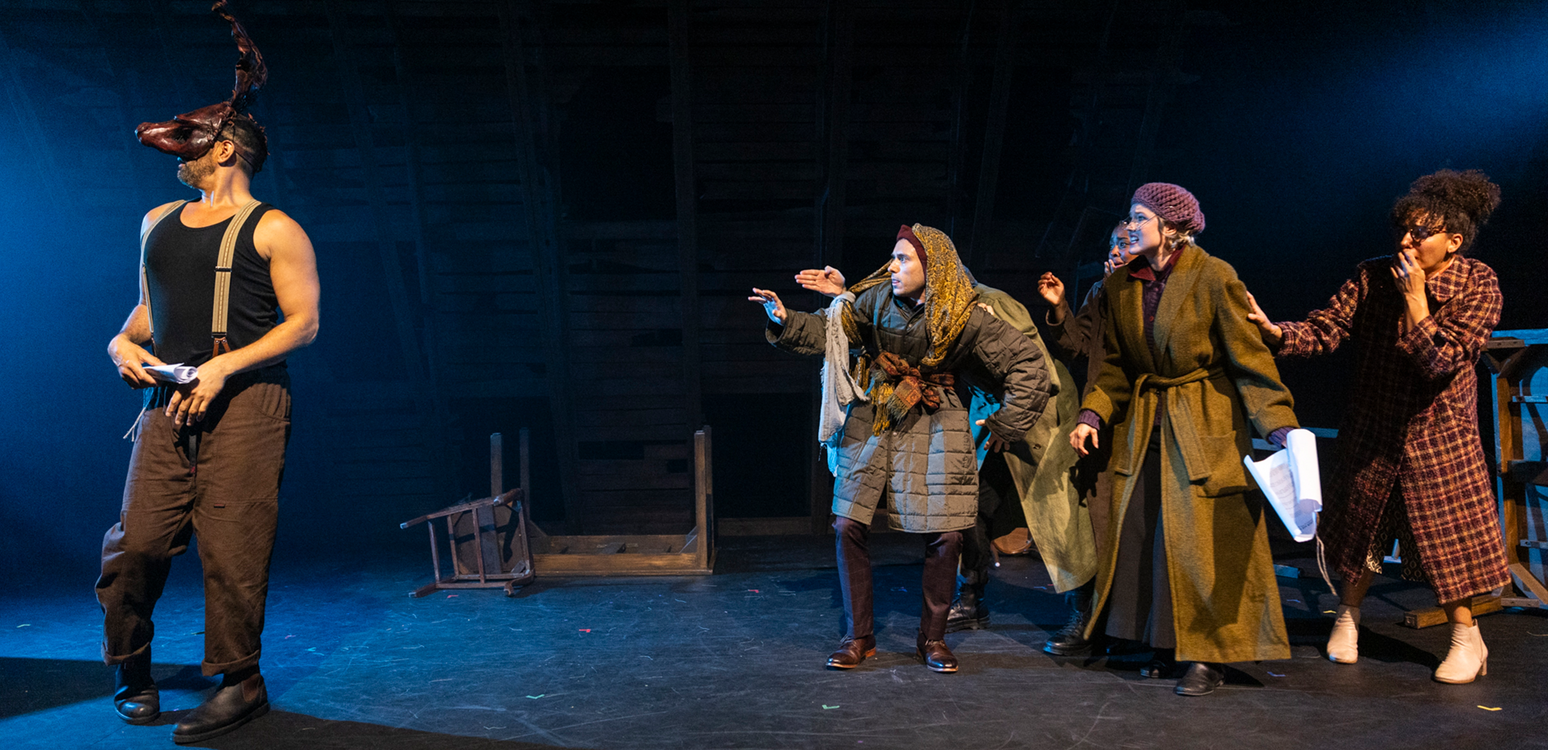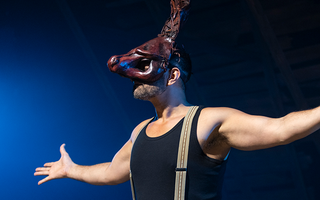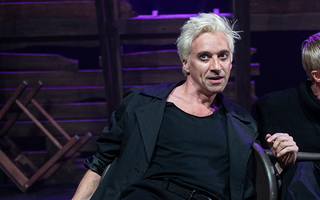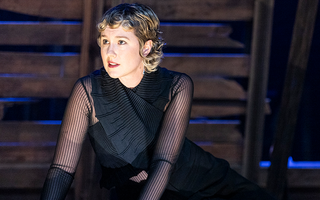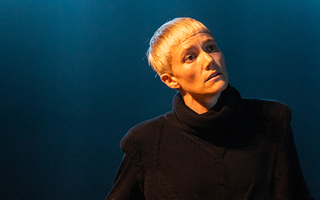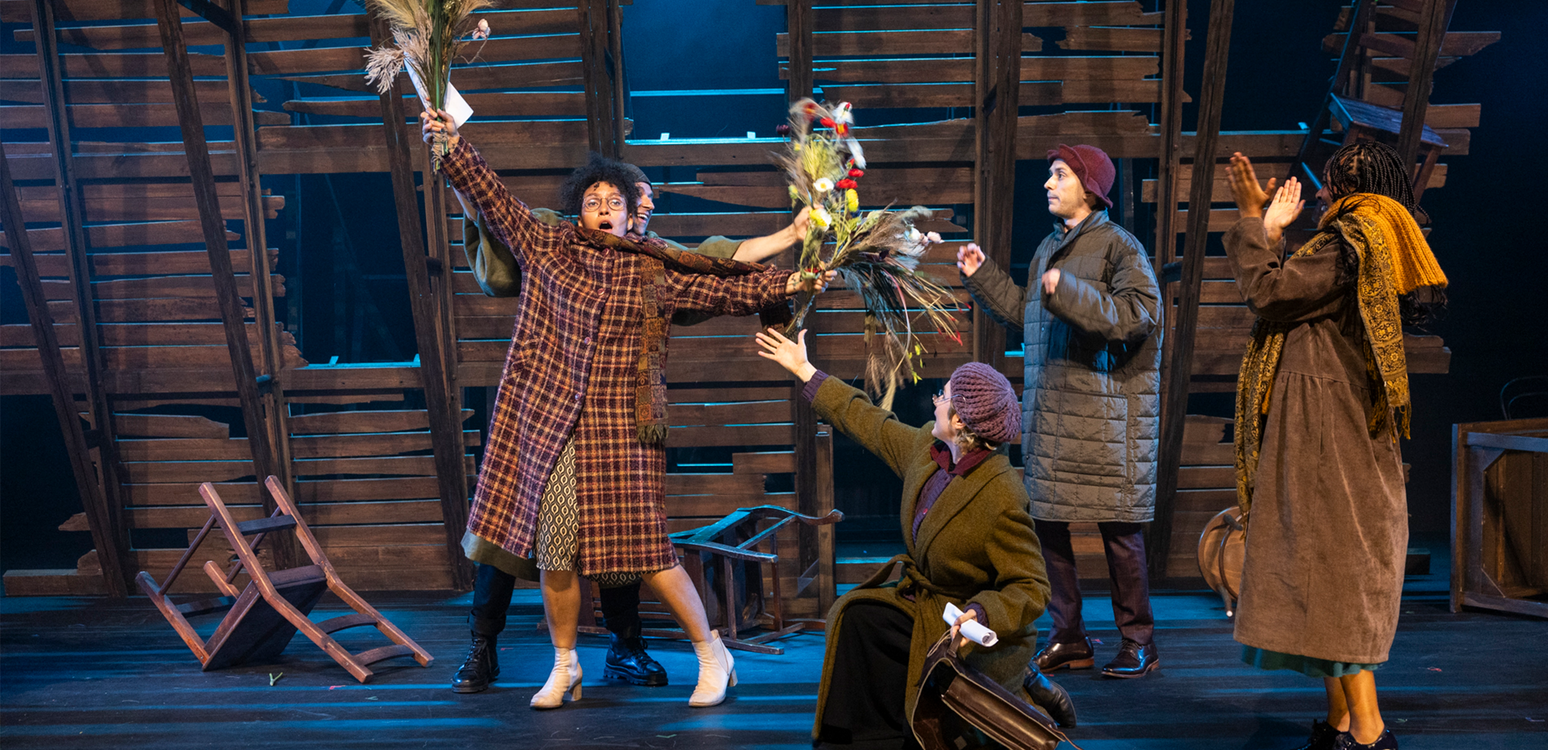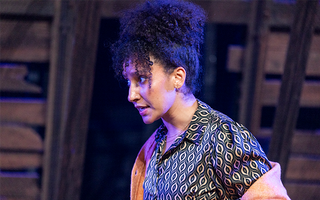
The course of true love never did run smooth.
Lysander, Act 1, Scene 1
Love is in the air in Athens, one midsummer night. A royal wedding is just days away.
Hermia and Lysander wish to marry, but Hermia’s father forbids it. Demetrius pines for Hermia, and Helena pines for Demetrius.
Determined to be together, Hermia and Lysander escape to the woods, with Helena and Demetrius in hot pursuit. But they are not alone. A group of tradespeople from Athens decide that the woods is the perfect place to rehearse their play for the royal wedding. Unknowingly, the humans stumble into the world of the fairies, who are in the mood for mischief. Three worlds collide in an explosion of comic confusion, love, magic, and mayhem.
One of Shakespeare’s best-loved comedies, A Midsummer Night’s Dream was written early in Shakespeare’s career, around the same time as Romeo and Juliet. While the play is one of love, laughter and magic, within the story Shakespeare also explores darker themes of jealousy, family conflict and fractured relationships.
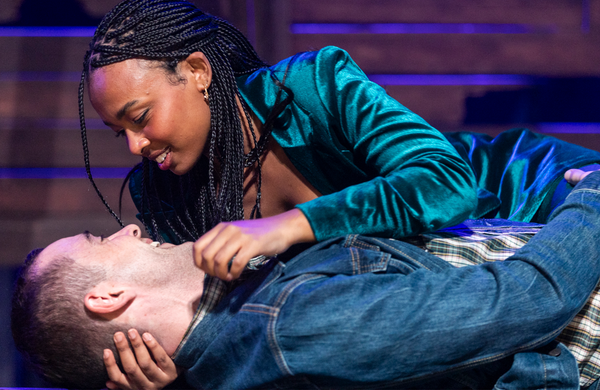
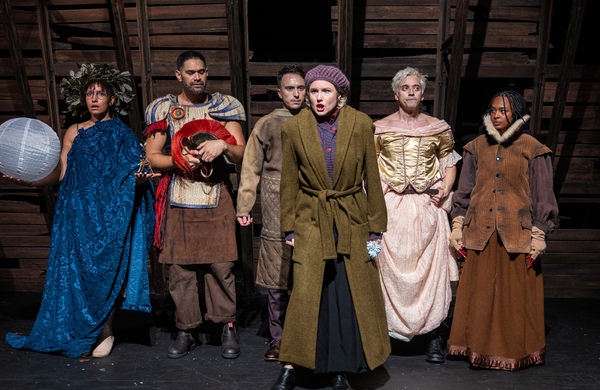
SYNOPSIS
The course of true love never did run smooth…
Lysander, Act 1, Scene 1
Duke Theseus of Athens and Hippolyta, Queen of the Amazons, are due to be married and celebrations are being planned for the occasion. Egeus, a nobleman, arrives in the Athenian court with his daughter Hermia in tow, along with Lysander and Demetrius. While Hermia and Lysander are in love, Egeus would prefer that Hermia married Demetrius. Furious at his daughter’s refusal to marry his preferred suitor, Egeus asks Duke Theseus to talk sense into her. The men remind Hermia of her daughterly duty to submit to her father’s will, while she pleads that her father respect her own feelings and mind.
Hermia is given until the new moon, the planned night of Theseus and Hippolyta’s wedding, to decide her own fate – either marry Demetrius, become a chaste nun, or die at her father’s hand. Left alone, Lysander and Hermia decide to run away together to marry. They plan to meet “in the wood, a league without the town” (Act 1, Scene 1) the following evening to elope and start a new life together.
Their planning is interrupted by Hermia’s childhood friend, Helena. She bemoans the changing affections of her one-time sweetheart, Demetrius, who is now in love with Hermia. Lysander and Hermia tell Helena of their planned elopement and say their farewells. Helena decides to tell Demetrius of this secret plan knowing that he will follow Hermia into the wood, in the hope that he will one day return her affections. That night, Hermia and Lysander steal away to the forest, with Demetrius and Helena in hot pursuit.
A group of tradesmen from Athens, the Mechanicals, are also in the forest. They’ve convened in a clearing for the purpose of rehearsing a play in secret - The Most Lamentable Comedy and Most Cruel Death of Pyramus and Thisbe. Led by their passionate director, Peter Quince, and lead actor, Nick Bottom, the Mechanicals hope their play will be selected as the entertainment for Theseus and Hippolyta’s wedding.
What thou seest when thou dost wake,
Do it for thy true-love take...
Oberon, Act 2, Scene 2
As the teenage lovers and the Mechanicals converge on the forest, they unknowingly enter the domain of the fairies. At the top of Act 2 we meet the mischievous sprite, Puck (or Robin Goodfellow), and the Queen and King of the Fairies, Titania and Oberon. The fairy rulers have set the natural world on its head with their warring over a “changeling boy” (Act 2, Scene 1) that Titania has adopted. Oberon wants the boy to be his henchman, but Titania refuses to hand him over. In revenge, Oberon decides to play a trick on Titania. He asks Puck to fetch him a magic flower whose juice, when squeezed on the eyes of someone when they are asleep, will cause them to fall in love with the first living creature they see on waking. Oberon sneaks up on the sleeping Titania and drops the juice of the flower in her eyes. He hopes that she will wake up when “some vile thing” is near (Act 2, Scene 2).
While Puck is doing his bidding, Oberon witnesses an argument between the teenage lovers who are stumbling through the forest – Demetrius in pursuit of Hermia, and Helena in pursuit of Demetrius. Helena professes her love to Demetrius, and he flatly rejects her advances in favour of Hermia. Oberon feels for Helena and decides to intervene, telling Puck to put the magic flower’s juice also in the eyes of Demetrius, the “disdainful youth” in “Athenian garments” (Act 2, Scene 1). Oberon hopes that this will make Demetrius fall in love with Helena.
Meanwhile, Hermia and Lysander have been trudging through the forest all evening and decide to rest. The opportunistic Lysander tries to cuddle up to Hermia, but she asks him to “lie further off”( Act 2, Scene 2). As they sleep, Puck happens upon them and, seeing Lysander’s “Athenian garments”, mistakes him for Demetrius. Puck anoints Lysander’s eyes as per Oberon’s instruction. Lysander wakes to see Helena, who is still running after Demetrius. Lysander instantly declares his undying love for Helena, to her great surprise and confusion. Helena runs away, and Lysander leaves Hermia, still sleeping, to pursue his new “love”. Hermia wakes up and cannot find Lysander anywhere, fearing he is dead.
Lord, what fools these mortals be!
Puck, Act 3, Scene 2
The Mechanicals have gathered in the forest once again to rehearse their play. They discuss the staging of their performance and try to solve various issues such as potentially frightening certain audience members with swords and lions. Puck stumbles upon the “hempen homespuns” (Act 3, Scene 1) and, realising their proximity to the sleeping Titania, decides to have some fun. As Bottom waits for his cue offstage, Puck transforms the amateur thespian’s head into that of a donkey. The terrified Mechanicals scramble away, deserting the transformed, and very confused, Bottom. He sings to himself to keep his fear at bay, unintentionally waking up Titania who falls instantly in love with him. He is led away to Titania’s bower and she asks her fairy attendants to lavish Bottom with food and precious gifts.
Puck races back to Oberon to tell his master of his playful meddling, but they quickly realise that Puck has bewitched the wrong Athenian man – Lysander instead of Demetrius. They try to rectify the mistake by applying the magic flower juice to Demetrius’ eye and summon Helena. Chaos ensues as now both Demetrius and Lysander fight for Helena’s love. Outraged and in disbelief, Helena assumes they are both mocking her, “O spite! O hell! I see you all are bent / To set against me for your merriment” (Act 3, Scene 2). Hermia arrives and is thrilled to find Lysander alive, yet he rejects her completely explaining that he now loves Helena. Helena and Hermia, in utter confusion, accuse each other of concocting the situation as some kind of cruel joke. While both insist on their ignorance and innocence, neither is willing to back down. Demetrius and Lysander continue to fight over Helena until they decide to take their feud further into the forest to fight “cheek by jowl” (Act 3, Scene 2).
While Puck watches the lovers’ chaotic quarrel in amusement, Oberon is furious that his servant’s error has caused such disarray. Oberon sends Puck after the teenagers to reverse the enchantment and rebalance the love scales.
I have had a most rare vision. I have had a dream…
Bottom, Act 4, Scene 1
Titania continues to dote on Bottom in her fairy bower, yet Oberon begins to pity her and decides to reverse the spell he placed on her. When Titania falls asleep, Oberon takes the enchantment from her eyes. She wakes to find her husband, and wonders how she could possibly have been so smitten with the half man, half beast before her. – “How came these things to pass? / O, how mine eyes do loathe his visage now!” (Act 4, Scene 1)
The teenage lovers, having exhausted themselves fighting and fleeing through the forest, have fallen asleep, allowing Puck to rectify his mistake. Theseus, Hippolyta and Egeus stumble upon them as they awake, confused. Lysander’s love for Hermia is restored, but Demetrius is still in love with Helena. As Demetrius is now disinterested in Hermia, Egeus concedes to his daughter marrying Lysander. The two happy couples marvel at their shared dream – “Are you sure / That we are awake? It seems to me / That yet we sleep, we dream.” (Act 4, Scene 1)
Bottom awakes in the forest restored to his former state, no longer with a donkey’s head, also marvelling at his strange “dream” (Act 4, Scene 1). He returns to the troupe of Mechanicals just in time for them to rush to offer their performance for the now triple-wedding of Theseus and Hippolyta, Hermia and Lysander, and Helena and Demetrius.
If we shadows have offended,
Think but this, and all is mended…
Puck, Act 5, Scene 1
It is time for the pre-wedding entertainment, and Duke Theseus asks Philostrate, the court’s “manager of mirth” (Act 5, Scene 1), what performances are on offer. Despite Philostrate’s insistence that the Mechanicals’ play is not worth seeing, Theseus chooses their performance.
The Mechanicals perform their play, A tedious brief scene of young Pyramus and his love Thisbe earnestly, while the newlyweds mock the play and performers throughout – “This is the silliest stuff that ever I heard” (Act 5, Scene 1). The play culminates in the tragical death of the two lovers, Pyramus and Thisbe. As the play concludes, Theseus bids “Lovers to bed; ‘tis almost fairy time.” (Act 5, Scene 1)
The play ends with the fairies, with newly reconciled Titania and Oberon blessing the new lovers and their future children. Puck has the final word, breaking the fourth wall and addressing the audience to beg for forgiveness for any offence caused in the performing of the play. Puck insists that if the audience didn’t like the play, they should simply imagine that it was all a dream.
Key Characters
Find out all about the characters in A Midsummer Night's Dream.
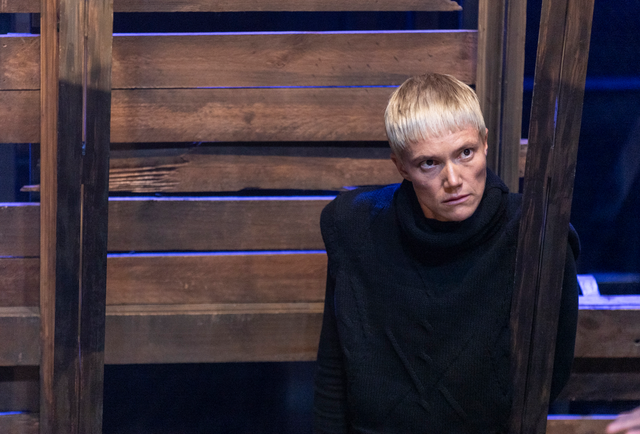
Fast facts
The word 'eye’ appears more than 60 times in the play, and the word 'moon’ appears more than 50 times.
Yet the word 'love’ is a clear winner, appearing over 150 times.
Themes
Discover the key themes explored in A Midsummer Night's Dream, with examples from the play.
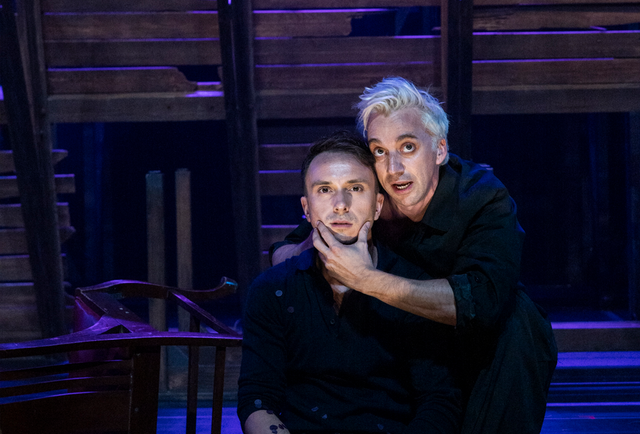
Debatable points
Is Demetrius still under a spell?
At the end of the play, when Oberon removes the love spell, he only does so from Lysander's eyes. This means that Lysander falls back in love with Hermia, but leaves Demetrius still ‘magically’ in love with Helena.
Imagery
Discover how Shakespeare’s uses vivid visual imagery in A Midsummer Night's Dream.
